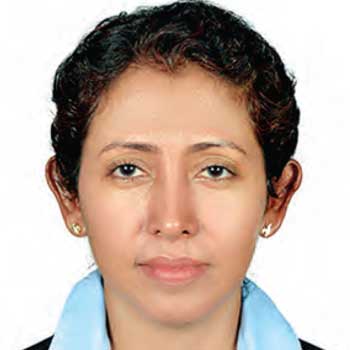Research and Leadership for Sustainability

In this ever-changing world, the concepts of research in sustainable business and leadership in judiciary has changed. Research, digital transformation and new technologies have to be used for making a business sustainable. The field of judiciary has also changed after the pandemic. Experts from various fields like digital currency, human rights, linguists and anthropologists have now been able to connect research to legal sphere. Judges are now trained across disciplines. Pandemic led to introduction of virtual learning, work from home policy and shifting of courts and trainings to online platforms.
At the MIMANSA 2023 – 2nd International Research Conference organised by Association of Indian Management Schools (AIMS) and Sri Balaji University, Pune(SBUP), held recently at SBUP campus, Amila Jayarathne, professor, University of Sri Jayewardenepura, Sri Lanka, talked on the topic of “Unleashing the power of research, navigating the technology driven business landscape”; while Dr Charisa-Marie Alexis-Francois, Executive Director, The Judicial Education Institute of Trinidad and Tobago(JEITT), West Indies, spoke on “Leadership and Sustainability”.
Power of research in business landscape
When the businesses are transforming from conventional businesses to digital platform, it is digital transformation, which also gives an opportunity for innovation. So then, others should know how the transformations occur to these companies. New business strategies are evolving, providing room for researchers to explore these new business strategies and sometimes proposing business models.
Customer experience
The other opportunity that comes is customer experience. People don’t buy the product but they buy the experience—you won’t buy the product or won’t get that further. For example, with refreshments, you won’t get like social engagement through the coke, it’s just the experience. Therefore, people even look at the conventional product that has been shifted from physical product to finer product, giving intangible experience. So, it’s an opportunity where businesses need to develop new strategies to capture that experience. The researchers should back the businesses to bring that sustainability to the business.
Data analytics
Data analytics is also an opportunity. As I keep on telling—on one side it is a challenge as it is a lot of innovation, but on the other side it is an opportunity because if we have large datasets, we can visualise a bigger picture due to the data analytics techniques, so that we can develop more number of strategies that are feasible.
Sustainability
You need to not just give best to the environment but also you need to balance all the three — environmental contributions, labour contribution and also the profits. So in most of the sustainable studies at the moment they are mainly focussing on the environment and social aspects for getting sustainability. But, I’m arguing here for business technology in business environment, like AI with machine learning. We as researchers, should also use those techniques for research, and the others are blockchain and distributed ledger technology.
The technologists see the blockchain in the businesses—they have changed the way they are connecting with one party to another party. Cyber security, digital ethics and privacy and how we are bringing green technology, are some of the trends that we can focus on research.
New approachs of research in the digital transformation process:

Amila Jayarathne is a professor at University of Sri Jayewardenepura, Sri Lanka. She has received her doctorate in management from University of Nottingham, UK; Masters in Policy Stud. (Tokyo); MSc in management (SJP); BSc Mkt. Mgt. (Special) (SJP). SLIM, SEDA. She has completed various teaching courses from UK and Sri Lankan universities and is a visiting lecturer to these universities. Her research papers have been published in highly ranked indexed journals and in peer- reviewed journals. She has also received fellowship and various scholarships and awards.
Focus on user experience: We have to perceive and focus on the user experience. People value the experience, so you have to capture the experience. For that you have to include more techniques and more approaches to get their experience captured in your studies.
Integrating on the big data analytics: As researchers we should also integrate data analytics in our research methods, so that we can get a deeper understanding about consumer behaviour.
Ethnographic research: It can be used to understand how people interact with technology in their daily lives. This includes understanding the ethnographic impact of technology on social behaviour, work habits, and other aspects of daily life.
Inter-disciplinary research: Unlike the traditional way we cannot have separate room for every discipline. Researchers are collaborating across disciplines to gain a deeper understanding of the impact of technology on business outcomes.
Longitudinal studies: We should know how the technology change is taking place both in the company’s perspective as well as whether they are moving towards materialistic side or they are moving towards money-oriented side. So this research will be very useful to businesses to sustain themselves.
Multimedia research: We have to use multimedia research, as the people’s behaviour is changing, the environment is changing, businesses are changing. You have to use as far as possible compatible research methods in one single research like online survey, virtual reality simulation and other suitable research methods to gather data on consumer behaviour and attitude towards technology to capture reality.
Collaborate with businesses: You have to collaborate with the businesses, then only you can identify the real business questions that are relevant to their needs and develop research studies to address those issues.
Attend industry conferences: Conferences are an excellent opportunity for academics to learn about the latest research findings and emerging trends in different industries. By attending these conferences, we can gain insights into the latest research methods and tools that can be used to address practical issues.
Conduct applied research: We will have to bring some new technology, encourage young researchers to have more applied research in the industry. We have to encourage applied research in the industry to find solutions to practical problems in specific industries.
Establish industry-academia partnerships: We can also have industry sponsored research centres from which academics can help the practitioners to sustain their businesses.
Use open access resources: Use open access resources to stay up-to-date on the latest research trends and findings, which can be used to address practical issues faced by businesses.
Translate academic research into practical solutions: Academic research is very complex and difficult to understand for non-academic audience. We as academics should know how to translate our research into the ways that the practitioner can understand and make use of it.
Summary
- Digital technologies have revolutionised business processes in the current era—to compete with this world, a lot of digitilisation in technologies is taking place.
- Social science research must be adapted to capture the changes in the business landscape driven by technology. Unless otherwise, we have a very crucial role as human researchers to find the practical solutions. If we are not contributing to the businesses, then we are not doing our job well.
- Novel approaches are required like use of technology such as online survey, big data analysis, multi methods, inter disciplinary, industry-based projects.
- We will need lots of innovations even in research as well, like using different methodologies, different technologies, different techniques, different tools and also lot of industry based projects and using multi methods.
Why edtech start-ups are not surviving for long?
One reason would be like many academics are not much familiar with using technology for education and research purposes. The other reason is like the users of this techniques are not much specific, like how to effectively use it.
Leadership and Sustainability
Traditional institutes support justice systems globally by offering ongoing instruction to judges and others to augment their knowledge, skills and proficiency. Key partners, the National Centre for State Courts, defines judicial education as programmes units or centres within courts or court systems that provide education and training to judges and also court personnel. I regard a traditional education as the inconspicuous guardian protecting our democracy, integrity and of course justice.
JEITT training engagements
Past training
A fundamental strength of the JEITT is commitments to cultivating well-rounded judges. This unique approach to judicial education concentrates on enhancing the judge’s expertise and abilities across various dimensions. In the past, judicial education primarily revolved around the old school way of doing judicial education, specifically law in terms of training and development. These old school ways of doing judicial education sessions focused on traditional proficiency ethics, civil and criminal law.
Present training
We have focus now in areas of gender, culture, implicit bias, procedural fairness and ethno musicology. As judicial education has evolved, we have seen an encompassing of inter disciplinary work. A few of our publications also speaks of the social legal research that seeks its indigenous voices. This is a very key aspect of engendering sustainability in our educational processes. It speaks of inclusivity and ownership of local knowledge of very critical elements to the project of authenticity and longevity in business operations.
In-house publications
We must document our sustainability projects. We must create dashboards to measure so that we can give this information back to our public. Training and delivery has broadened to include subject matter experts from fields beyond law, creating opportunities for professionals in the fields of digital currency, human rights, linguists and anthropologists. All of whom have now been able to connect research to the legal sphere.
Well rounded approach—judges have also broken the one-track mode of legal qualifications and they are now trained across disciplines, which has enabled to inculcate best practice and corporate governance. As it relates to the judiciary, Justice Jones from the U.S. emphasises that a well-rounded approach that considers legal, cultural, social and emotional factors in a case, enhances a judge’s ability to make informed decisions that are legally, culturally sensitive, emotionally intelligent and socially just. One who is able to embrace such a broad perspective, is the one who will not only make an excellent decision but create for a sound bench. It’s also important that we draw similar parallels to our C-Suite professionals and our professional leaders in business environments.
Reflection 1 - Have leaders placed a high value on inter-disciplinary training and the critical role that it plays in fostering social sustainability for our business?

Dr Charisa-Marie Alexis-Francois is Executive Director, The Judicial Education Institute of Trinidad and Tobago(JEITT), West Indies for more than two years. She has received Ph. D. from University of the West Indies, St. Augustine campus. She is also the director, The East Port of Spain Development Company – TT.
The strength of the JEITT is a commitment to providing opportunities and mentorship for junior judges and traditional officials via training engagements and initiatives. Justice George Ginsburg, stated that the very best way to learn is from someone who has already been there. Our president, the chief justice, has taken a very hands-on approach in ensuring that the judiciary’s professionals are up the mark. An example of this would be the most recent reading session held where he met with over 100 judges and judicial officers to analyse the soon-to-be administration of justice and indictable proceedings Act of 2020. The purpose of this law is to reform the criminal justice sector, by introducing a new system from computing indictable offenses. Effective mentorship is a key component of sustainability as it empowers individuals to grow, learn and lead in a way that creates positive impact both on people and on the planet.
Reflection 2 - How important is mentorship to achieving sustainability within our respective sectors. Do we have established mentorship programmes within our organisations or businesses?
Establishing robust long-term relationships is another key and essential aspect of promoting sustainable business practices within judicial education, as it fosters and promotes knowledge sharing and facilitates effective communication by the individuals, and organisations can achieve more viable outcomes.
Fundamentally when judges connect with each other they can learn from personal experiences and gain new insights. They are able to build relationships and establish broader professional networks. We have been able to hold karaoke competitions, game days and fun runs to promote emotional health and wellness and well-being for continuous learning and professional development.
These events can be especially important for judges who sometimes work in isolation or are forced to live very close lives for security reasons. Again George Ginsburg states that the judges should spend time together not only to learn from each other but also to develop a sense of collegiality that fear administration of justice. These initiatives are fostered to promote knowledge sharing and gain effective communication. This is also important for replication into the corporate sphere where professionals are healthy and engaged. They are better equipped to perform; the organisation is also better equipped to retain the talent critical to build sustainable business
Reflection 3 - Do we prioritise authentic relationships and connection as critical features of leadership and sustainability? If yes, what are we doing to expand our current networks for greater opportunity?

During the pandemic, the judiciary faced significant challenges. Our country with a population of only 1.4 million people never ever experienced a health crisis of this magnitude, leading to great fear. However, under the leadership of our chief justice we responded quickly by implementing a work-from-home policy, establishing an internal medical response team that was separate and part to the larger system. And, of course we shifted all of our courts and trainings to online platforms. Our organisation was able to adapt quickly. However, we still faced some challenges. First the Covid pandemic resulted in huge budget cuts in many traditional organisations, forcing us to re-evaluate our financial position and seek out potential new partnerships.
Second, the sudden shift of virtual learning had a profound effect on our judges, including challenges with time management, technophobia, feelings of isolation and burnout. To overcome these obstacles, our board of directors engaged in high-level discussions to re-strategise. We placed a strong emphasis on creativity, social responsibility and sustainability. We prioritised the development of new services to ensure that our organisation remains resilient in the face of adversity.
Reflection 4 - Have we truly invested time and resources into strategic planning/ plans and visioning for a sustainable future?
In line with the UN’s sustainable development goals number 4 – quality education and 16 – peace, justice and strong institutions, particularly we adopted a pedagogy that was tailored to the learners in a virtual environment. Experiential online training courses, learning options, virtual workshops, collaborative learning opportunities and flexible scheduling were curated to ensure inclusion and equitability in all our training offerings. We transformed our approaches to ones that encourage digital communication and ongoing collaboration. Focus had to be given to building virtual communities for peer-to-peer interactions. We accomplished this by working closely with our judicial trainers to create engaging and exciting content in the form of videos, lectures, games, dramatic presentations, case studies.
Our training team also encouraged deep alliances with facilities, which came in the form of peer-to-peer learning, mentoring, peer review before sessions, pre-meetings and post- meetings. We also provided training feedback. Smart training rooms have been created to provide training to learners.